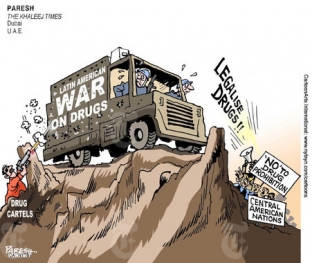The OAS Summit at Cartagena in April saw a remarkable shift in attitude towards the continent-wide drug problem and a near consensus that US policy of ‘war on drugs’ has failed and is no longer sustainable. While cautious about any rapid or dramatic change being imminent, the authors of this useful TNI briefing welcome the opening-up of discussion and make clear but modest recommendations.
Amira Armenta, Pien Metaal & Martin Jelsma
Transnational Institute
Remarkable drug policy developments are taking place in Latin America. This is not only at the level of political debate, but is also reflected in actual legislative changes in a number of countries. All in all there is an undeniable regional trend of moving away from the ‘war on drugs’. This briefing explains the background to the opening of the drug policy debate in the region, summarises the most relevant aspects of the ongoing drug law reforms in some countries, and makes a series of recommendations that could help to move the debate forward in a productive manner.
 The high expectations of a high-level debate on current drug policy regimes in the Americas at the sixth Organization of American States (OAS) Summit in April 2012, in Cartagena, Colombia, were quickly tempered to a general approval that the topic had been discussed at this level at all. The summit’s outcome can be called both a failure and a success: no alternatives to prohibition were discussed, but all agreed that the effectiveness of current strategies should be looked into. The OAS was mandated to undertake a study and discuss the gathered evidence for more effective alternative strategies in 2013.
The high expectations of a high-level debate on current drug policy regimes in the Americas at the sixth Organization of American States (OAS) Summit in April 2012, in Cartagena, Colombia, were quickly tempered to a general approval that the topic had been discussed at this level at all. The summit’s outcome can be called both a failure and a success: no alternatives to prohibition were discussed, but all agreed that the effectiveness of current strategies should be looked into. The OAS was mandated to undertake a study and discuss the gathered evidence for more effective alternative strategies in 2013.
The International Conference of Ministers of Foreign Affairs and Heads of Specialized National Agencies against the World Drug Problem, in Lima on 25 and 26 of June, will be the next opportunity for high level policy makers to discuss both the content and form of this evaluation or study. Another opportunity arises concurrently on June 26, in New York, where there will be a thematic debate on ‘Drugs and Crime as a Threat to Development’ on the occasion of the UN International Day Against Drug Abuse and Illicit Trafficking, at the 66th Session of the United Nations General Assembly.
It was due to the insistence and efforts of Presidents Otto Pérez Molina (Guatemala) and Juan Manuel Santos (Colombia), and the extensive media attention in the run-up to the April Summit in Cartagena, that the issue was present at all on the agenda of the Summit. At last, some of the frustrations with U.S.-promoted drug control policies were on the table at the highest political level in the American hemisphere: the “genie was freed from the bottle”. Behind closed doors and for Presidents and heads of delegations only, the “hot but hidden” issue was discussed on the Sunday afternoon, in “an open and frank manner”, according to the host President Santos.
The emergence of an increasingly independent and assertive Latin America insisting on a change of direction in drug control policies reflects an important shift in its relationship with the United States. The demand for “democratization” of the debate and alternative policy options stems from the perception that Latin American societies pay a disproportionate price in lost lives, hijacked justice systems, abuses in overcrowded prisons, and displaced small farmers, because of the U.S.-led strategy that has prioritised stemming the supply of drugs over reducing its own demand. The U.S. Senate Caucus on International Narcotics Control acknowledged as much in its latest report, saying that “the United States must do significantly more to reduce our country’s demand for illegal drugs. Ultimately, it is drug consumption in the United States that fuels violence throughout Latin America and the Caribbean.” This is not to say that U.S. society hasn’t also paid a high price for repressive domestic drug law enforcement, in terms of drug-related violence and overcrowded prisons.
CONCLUSIONS & RECOMMENDATIONS
• Ensure that the OAS-mandated study on alternative drug policy options will be an honest and open-minded reflection on different models and strategies
• Support moves towards the legal regulation of the cannabis market and explore with a coalition of like-minded countries how best to resolve the legal conflict with the UN conventions
• Elaborate substance-specific proposals for managing different drug submarkets
• Experiment with harm reduction policy measures to reduce the level of drug-related violence
• Support the legal right to coca chewing and allow a licit coca market to develop in the whole region
• Secure civil society participation in the debate on drug policy reform
• Challenge provisions in the UN conventions that are obstacles to advancing with evidence-based reforms.

